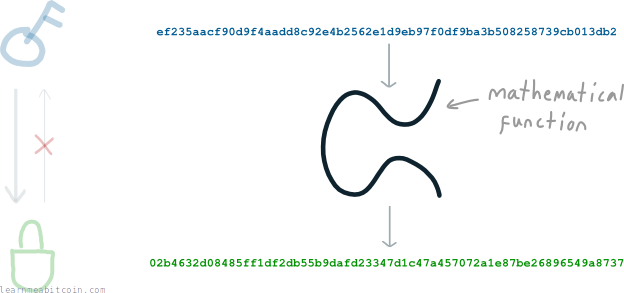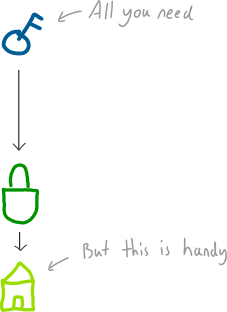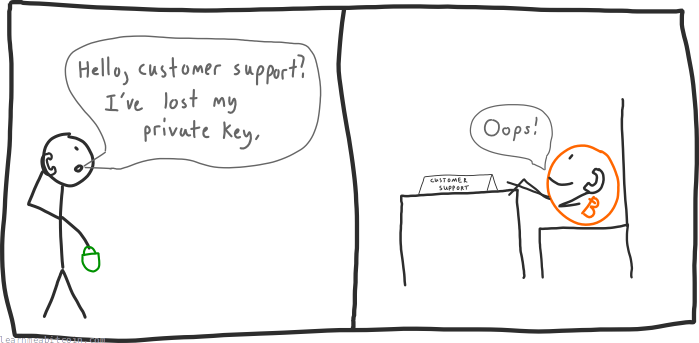Keys & Addresses
How do you send and receive bitcoins?
To send and receive bitcoins you need some sort of "account number" and "password".
In Bitcoin, we call these a public key and a private key.

Here are your account details. Welcome to Bitcoin.
However, this "account number" is an awkwardly long number. So to make life easier we create a shortened version of this public key, which we call an address.

You'll see how hideous the public key is in a moment.
So to summarize:
- Public Key – Your account number.
- Address –Also your account number, but a shorter version that people use when sending you bitcoins.
- Private Key – Your password. This prevents other people from sending bitcoins from your address.
Where do keys and addresses come from?
All the keys used in Bitcoin are randomly generated on your computer.
Private Key
It all starts with the private key, which is just a randomly generated number:

But because this number is so large, we usually display it in hexadecimal format:

Hexadecimal numbers are shorter than decimal numbers because they also use the letters a, b, c, d, e and f.
And there we have a private key; just a big random number.
For example:
| Private Key | ef235aacf90d9f4aadd8c92e4b2562e1d9eb97f0df9ba3b508258739cb013db2 |
|---|
Do not use the example private key (or address) on this page. I'm just showing these as examples of what they look like. All of your private keys should be generated securely on your own computer/device and kept secret.
A private key can be any number between 1 and 115792089237316195423570985008687907852837564279074904382605163141518161494336.
Public Key
You use your private key to calculate your public key.
But first, this public key is going to be seen by other people. Therefore, when we use the private key to create our public key, we don't want it to be possible for anyone to figure out what our private key was.
Because after all, the private key protects our bitcoins.

We don't want anyone to be able to work backwards from the public key to the private key.
Fortunately, we can use a special type of mathematical function to achieve this.
We just shove the private key (which is a number after all) in to this function, and the function spits out a public key (which is another number again).

Now, there are two benefits of using this particular function:
- There is a mathematical connection between the private key and public key. This will come in handy later on when we want to spend our bitcoins in a transaction.

- It's not possible to figure out the private key from the public key. Even though the public key is calculated from the private key, we're using what's known as a "one-way" function, so you can't work backwards from the public key to calculate the private key.
And ta-da, thanks to our random number and this function, we now have a pair of keys that we can use to send and receive bitcoins:
| Private Key | ef235aacf90d9f4aadd8c92e4b2562e1d9eb97f0df9ba3b508258739cb013db2 |
|---|---|
| Public Key | 02b4632d08485ff1df2db55b9dafd23347d1c47a457072a1e87be26896549a8737 |
Address
That public key is hideous isn't it. Nobody is going to enjoy typing that out.
So let's make it a bit prettier and call it an address.

Thank goodness.
All we've done here is compress the public key (using hash functions), and convert it to a format that doesn't use any characters that look similar to each other when written down (called Base58).
So it's still not the shortest and sweetest piece of data you've ever seen, but it is an improvement.
And that's all an address is; a shorter version of the public key:
| Private Key | ef235aacf90d9f4aadd8c92e4b2562e1d9eb97f0df9ba3b508258739cb013db2 |
|---|---|
| Public Key | 02b4632d08485ff1df2db55b9dafd23347d1c47a457072a1e87be26896549a8737 |
| Address | 1EUXSxuUVy2PC5enGXR1a3yxbEjNWMHuem |
It's not possible to work backwards from the address to the public key either. This is due to the use of hash functions when compressing the public key.
Do I have to remember all 3 keys?
Because your public key and address are worked out from your private key, you can get away with just saving your private key.

So if worse comes to worst, if you ever need to send your address to someone, you can just work it out from your private key.
You're most likely going to be using a wallet, so managing your individual private keys and addresses isn't really an issue. The only thing you need to keep safe when using a wallet is your seed.
What happens if I lose my private key?
Well then you're fu…lly out of luck.
It's impossible to work out your private key from either your public key or address, so if you lose your private key, it's gone.
You can't calculate your private key from your address or public key.
And if you haven't got the private key for an address, any bitcoins located at that address will be locked there forever.
How's that for security?
This may seem like an unforgiving system, and that's because it is.
On the other hand, it's refreshing to know that there are no backdoors to your money. There is only one key to your bitcoins, and you're in charge of it.
